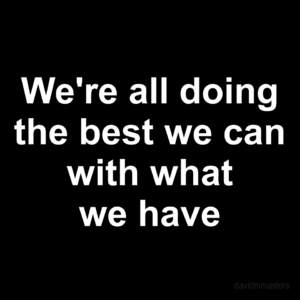When someone judges you, you feel slighted or are offended. Thankfully, for the most part, you have no idea how often you are judged by you, what they say behind your back, what they think or judgments they make about you which are rarely, if ever, spoken.
When you become aware that someone has assumed something about you which is not true based on some small detail which you thought was innocuous, but to them it triggered a whole lifetime of living, tracking information, categorization, and complicated belief and protective emotional and rational processing.
Often people come to quick conclusions based on their observations and perceptions so as to save valuable time in a fast-paced world, and as our world gets more and more fast-paced we assume and categorize more just because we don’t have the contact with people which would be required to really get to know someone.
People judge you because they don’t know you, who you really are, and because they lack self-confidence, feel threatened by you, or are preoccupied with fear.
When someone judges you, it is unfair and doesn’t adequately represent how you feel, what you do, or who you are no one would blame you for getting upset, angry, or having your feelings hurt when someone judges you.
What do you do when someone judges you unjustly?
Try not to take it personally.
I know that sounds like a tall order because how could you not take what someone thinks or says about you personally? I mean, it’s about you, right? How much more personal does it get?
Before you get defensive, you might consider that the person who has judged you prematurely, incorrectly, or unjustly may be doing so with very little regard for you.
When someone judges you, they do so based on their own lifetime of experience. The use of one word or phrase, a particular style of apparel or makeup, your choice of material goods or services, the way you walk or look at someone, even your tone of voice and the way you breathe. Any or all these things (and many more) can trigger a whole subroutine spanning years of collected data connected to someone’s negative past, and you are judged.
Let’s face it no one knows you better than you and if you could cut yourself, and your judge, a little slack, for certain there is no way that the person who has judged you could possibly know everything about you which would prove the injustice of his or her judgment based on very little real data.
You are offended, and you recoil from someone’s brash assumptions about something that couldn’t be further from the truth, and you feel like defending yourself or feel the inclination to give them a piece of their own medicine and spend time analyzing and judging the person who has judged you.
If you were honest with yourself, you could admit that you also have a propensity to judge others prematurely. We all do it to varying degrees. It is part and parcel of the human condition.
Thousands of years ago sage advice was handed down to us to, “Judge not lest ye be judged,” and, “Let he who is without sin cast the first stone.” Indicators that this cycle of judgment of others and separating ourselves from others based on appearances or assumptions has been going on for a long time.
When someone judges you, it feels like abuse, and in many cases, it could be viewed as abusive behavior. This judgmental cycle of abuse could be stopped if more people would stop projecting their own perceptions onto others, though this would be not easy undertaking.
Nonetheless, there is a change taking place, and others are starting to exercise concerted efforts not to judge others, and you could be one of them.
Plus, the law of attraction is at play here, for when you judge others, you attract more judgment from others.
You could try not to judge others because you don’t like being judged by others. You can take the high road and set a good example of how we can better respect each other in a world that is spinning out of control.
The next time someone judges you, remember their assumption have very little to do with you, it is more based on his or her own fear, anger, or insecurities, for if they were more motivated by love, they might be more understanding of you and others.
Love, authentic love, doesn’t judge. Love seeks to understand, is empathetic, and compassionate.
Love is good, kind, and realizes that we, all of us, are simply doing the best we can with what we have, and offers others the same rights and privileges, that we might like to have for ourselves.

